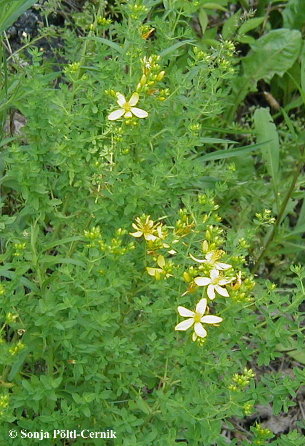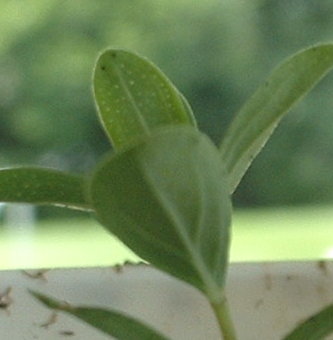HERB OF THE MONTH:
St. John's Wort:
 The ancient Greeks believed that the fragrance of St. John's Wort would cause evil spirits
to fly away. The early Christians converted the herb into a symbol of St. John the Baptist
because it flowers about June 24, the day the church designated as St. John's Day.
The ancient Greeks believed that the fragrance of St. John's Wort would cause evil spirits
to fly away. The early Christians converted the herb into a symbol of St. John the Baptist
because it flowers about June 24, the day the church designated as St. John's Day.
Botanical name: Hypericum perforatum
Identification: An erect perennial herb that grows up to 32 inches tall and has a somewhat
woody base. Oval shaped leaves grow in opposite pairs and have perforation all over them.
When you hold them against the light you can see the tiny holes which are actually no real
holes - they are filled with essential oil (as seen on next picture). That's why its Latin
name is Hypericum perforatum. Its flowers are starlike golden yellow.
Uses: American Indians used a tea brewed from the plant for tuberculosis and other
respiratory ailments. Plant extracts have exhibited anti-inflammatory activity in
laboratory animals, and in test tube experiments extracts have been active against the
bacterium that causes tuberculosis.
Herbalist use the ointment or oil for bruises, skin irritations, insect bites and other wounds.
It is also used against sun burn. As a tea it is also known as a natural remedy for
depression.
 In Homeopathy Hypericum is used as a trauma remedy especially when nerval damage is involved.
Shooting pain is a leading symptom of that remedy.
It is also used successfully against Tetanus. As the homeopathic mother tincture it is
applied to open wounds for better and faster healing (watch - because of the alcohol
content of tinctures it could burn. You can dilute it a bit with boiled water to lessen
the burning effect). Tincture and remedy are available at the Natural Path.
In Homeopathy Hypericum is used as a trauma remedy especially when nerval damage is involved.
Shooting pain is a leading symptom of that remedy.
It is also used successfully against Tetanus. As the homeopathic mother tincture it is
applied to open wounds for better and faster healing (watch - because of the alcohol
content of tinctures it could burn. You can dilute it a bit with boiled water to lessen
the burning effect). Tincture and remedy are available at the Natural Path.
Warning: Because of the hypericin content the plant ingested can cause photosensitivity
in light skinned people. As long as you are on St. John's Wort supplements avoid the sun.
This statement does not apply to the homeopathic remedy. Homeopathics are safe with no
exceptions.
How to make St. John's Wort Oil yourself: The only plant parts that are used to make the
oil are the flowers, no leaves or stems. Although some herb books mention the leaves too
but you won't get the intense red color when you mix in too many leaves with the flowers.
When you squeeze the flower between your fingers it gives of a hint of red color. That's
one of the signs that you pick the right herb. Get yourself a big green or brown (or at
least dark tinted) jar with a big opening and also good quality olive oil. Fill up the
jar with lots of the blossoms. Pour 3 to 4 times the amount of olive oil on it and watch
that no plant part sticks out of the surface. Otherwise it might get moldy. Cover it with
a clean cloth if you would like to prevent that from happening. Let it sit in the sun for
6 to 7 weeks. If you did everything right the oil turned red. Drain the oil and store it
in a dark, cool place. You can enjoy the healing properties of it for 2 years. That's how
long it lasts.
Personal statement: Medical research on herbs in
general lacks a very important detail.
They usually never use the herb in its wholeness, they only use an extracted substance and
don't seem to be able to come up with the healing effects herbalists come up with for
centuries. It is the combination of substances in one herb that supports the healing in
your body not one chemical substance. In case of St. John's Wort it is probably not the
hypericin but instead hyperforin and its structural analogue adhyperforin that helps people
with depression.
This is my own personal opinion and I do not intend to diagose nor
prescribe. My only intention is to educate.
Interesting links for St. John's Wort:
http://altmedicine.about.com/cs/anxietydepression/a/SJW.htm
http://www.biopsychiatry.com/saintjohnswort.htm
